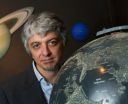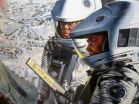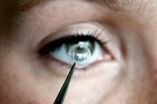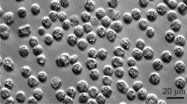(Press-News.org) Academics at the University of Strathclyde in Glasgow are set to investigate the removal of space debris and deflection of asteroids – leading the first research-based training network of its kind in the world.
The 'Stardust' project will train the next generation of scientists, engineers and policy-makers with Strathclyde leading 14 partners across Europe in a new €4 million programme.
The European Commission-funded network will launch early next year and its pioneering research will have a significant impact on the future decisions of Europe on some of the most pressing issues in current space research. The University is already home to Scotland's largest space engineering centre.
Professor Sir Jim McDonald, Principal of the University of Strathclyde, said: "To be selected to lead this international area of space research is an excellent achievement and demonstrates the strength of our research capabilities and our success in working with partners in academia and industry.
"The observation, manipulation and disposal of space debris and asteroids represent one of the most challenging goals for modern space technology. Stardust will provide Strathclyde with the opportunity to make the significant advances needed to help protect our planet."
Stardust will be led by Dr Massimilano Vasile of the University of Strathclyde's Department of Mechanical and Aerospace Engineering, which is also the base for the Advanced Space Concepts Laboratory – a pioneering research hub which is delivering new approaches to space systems engineering to underpin new space-derived products and services for science, telecommunications and Earth observation.
Also based within the department is the Centre for Future Air-Space Transportation Technology, a research base dedicated to revolutionising future air and space travel – and putting Scottish space engineering on the map.
Dr Vasile said: "Asteroids and space debris represent a significant hazard for space and terrestrial assets and could have potentially devastating consequences for our planet.
"The two share a number of commonalities. Both are uncontrolled objects whose orbit is deeply affected by a number of gravitational and non-gravitational interactions, both have an irregular shape and an uncertain attitude motion, and both are made of inhomogeneous materials that can respond unexpectedly to a deflection action.
"Such a significant multidisciplinary technical challenge, with real societal benefit for the future, represents a compelling topic for a training network. I am delighted that we have secured this level of funding and we are looking forward to pushing the boundaries of current technologies and developing the next generation of space experts."
INFORMATION:
The work at Strathclyde will involve collaboration between the Advanced Space Concepts Laboratory, the Centre for Future Air-Space Transportation Technology and the Institute of Photonics.
Stardust's 14 partners across Europe include: the European Space Agency, two national research centres (CNR in Italy and CNRS in France), three major companies (Astrium, Deimos and Telespazio) and seven academic institutions (Strathclyde, Southampton, DFKi Bremen, the Astronomical Observatory of Belgrade, University of Rome Tor Vergata, University of Pisa, University of Madrid) and one SME (Dinamica).
Strathclyde take the lead in space research
'Stardust' project will train the next generation of scientists, engineers and policy-makers
2012-10-04
ELSE PRESS RELEASES FROM THIS DATE:
Science fiction is not put to good use in teaching
2012-10-04
A study at the University of Valencia ensures that science fiction, especially the cinema, is very popular amongst secondary school students and teachers see it as a good way of motivating interest in the sciences. However, out of the 31 textbooks analysed, only nine make some form of reference to science fiction cinema as a teaching resource.
"A current concern is that students are no longer studying science and engineering and this trend is more common amongst females. Science fiction can be useful in awaking the scientific vocation of younger students," as explained ...
Hi-fi single photons
2012-10-04
Many quantum technologies—such as cryptography, quantum computing and quantum networks—hinge on the use of single photons. While she was at the Kastler Brossel Laboratory (affiliated with the Pierre and Marie Curie University, École Normale Supérieure and CNRS) in Paris, France, Virginia d'Auria and her colleagues identified the extent to which photon detector characteristics shape the preparation of a photon source designed to reliably generate single photons. In a paper about to be published in EPJ D, the French team determined the value of key source parameters that ...
Lakes react differently to warmer climate
2012-10-04
The study in question has been carried out by a group of researchers at the Department of Biology at Lund University. The research team is specifically focusing on predictions regarding how our water resources will be like in the future, in terms of drinking water, recreation, fishing and biodiversity. They have now published findings on the impact of a warmer climate on lakes in the journal Nature Climate Change.
"The most interesting and unexpected result from the study is that the reaction to climate change will vary between lakes; this has been observed previously ...
Artificial cornea gives the gift of vision
2012-10-04
Our eyes are our window to the world. Thousands of people have lost their eyesight due to damages to the cornea, such as trauma, absent limbal stem cells or diseases. Transplantation of a donor cornea is the therapy of choice for a great number of those patients. Let alone the issue of scarce donor material, a sub-group of patients do not tolerate transplanted corneas, necessitating the employment of an alternative means of restoring eye sight. In Germany alone, around 7,000 patients are waiting to be treated. In close cooperation with the Aachen Centre of Technology ...
Researchers a step closer to controlling inflammation in MS
2012-10-04
A University of Adelaide researcher has published results that suggest a possible new mechanism to control multiple sclerosis (MS).
Dr Iain Comerford from the University's School of Molecular and Biomedical Science earned a three-year fellowship from MS Research Australia to work on this project. It is directed towards understanding how specific enzymes in cells of the immune system regulate immune cell activation and migration.
Along with his colleagues, Professor Shaun McColl and PhD students Wendel Litchfield and Ervin Kara, he focused on a molecule known as PI3Kgamma, ...
More certainty on uncertainty's quantum mechanical role
2012-10-04
WASHINGTON, Oct. 4—Scientists who study the ultra-small world of atoms know it is impossible to make certain simultaneous measurements, for example finding out both the location and momentum of an electron, with an arbitrarily high level of precision. Because measurements disturb the system, increased certainty in the first measurement leads to increased uncertainty in the second. The mathematics of this unintuitive concept – a hallmark of quantum mechanics – were first formulated by the famous physicist Werner Heisenberg at the beginning of the 20th century and became ...
VIMS researchers unravel life cycle of blue-crab parasite
2012-10-04
Professor Jeff Shields and colleagues at the Virginia Institute of Marine Science have succeeded in their 15-year effort to unravel the life history of Hematodinium, a single-celled parasite that afflicts blue crabs and is of growing concern to aquaculture operations and wild fisheries around the world.
Knowledge of the parasite's complex life cycle—gained by rearing of successive generations across a full year in a VIMS laboratory—will help guide efforts to understand the transmission of Hematodinium within crab populations and shrimp farms, and to develop best practices ...
Fox squirrels show long-term investment savvy when hoarding nuts
2012-10-04
Researchers at the University of California, Berkeley, are gathering evidence this fall that the feisty fox squirrels scampering around campus are not just mindlessly foraging for food, but engaging in a long-term savings strategy. Humans could learn something about padding their nest eggs from squirrels' diversification efforts.
Of course, with squirrels, it's not about money, but about nuts.
"Think of them as little bankers depositing money and spreading it out in different funds, and doing some management of those funds," said Mikel Delgado, a doctoral student ...
Nonprescription medication abuse underestimated
2012-10-04
Nonprescription medications are just as likely a cause of poisoning as prescription drugs, according to a new study by Timothy Wiegand, M.D. from the University of Rochester Medical Center in the US and colleagues. Their work, which analyzes the data from the second annual report of the Toxicology Investigators Consortium (ToxIC), is published online in Springer's Journal of Medical Toxicology.
In 2010, the American College of Medical Toxicology established its case registry, ToxIC, which acts as a real-time surveillance system to identify current poisoning trends, and ...
Study reveals how bicultural consumers respond to marketing cues
2012-10-04
NEW YORK - October 4, 2012 - Consider a Japanese-American woman strolling through a mall. If she passes by a UNIQLO store, is she more likely to opt for sushi than a hamburger when she reaches the food court? Would this cue of Japanese culture draw out her Japanese side? The answer, according to new research from Columbia Business School's Michael Morris, the Chavkin-Chang Professor of Leadership, and Aurelia Mok, Assistant Professor, City University of Hong Kong (she received her Ph.D. from Columbia Business School in 2010), depends on the degree to which she has integrated ...
LAST 30 PRESS RELEASES:
Evidence of a subsurface lava tube on Venus
New trial aims to transform how we track our daily diet
People are more helpful when in poor environments
How big can a planet be? With very large gas giants, it can be hard to tell
New method measures energy dissipation in the smallest devices
More than 1,000 institutions worldwide now partner with MDPI on open access
Chronic alcohol use reshapes gene expression in key human brain regions linked to relapse vulnerability and neural damage
Have associations between historical redlining and breast cancer survival changed over time?
Brief, intensive exercise helps patients with panic disorder more than standard care
How to “green” operating rooms: new guideline advises reduce, reuse, recycle, and rethink
What makes healthy boundaries – and how to implement them – according to a psychotherapist
UK’s growing synthetic opioid problem: Nitazene deaths could be underestimated by a third
How rice plants tell head from toe during early growth
Scientists design solar-responsive biochar that accelerates environmental cleanup
Construction of a localized immune niche via supramolecular hydrogel vaccine to elicit durable and enhanced immunity against infectious diseases
Deep learning-based discovery of tetrahydrocarbazoles as broad-spectrum antitumor agents and click-activated strategy for targeted cancer therapy
DHL-11, a novel prieurianin-type limonoid isolated from Munronia henryi, targeting IMPDH2 to inhibit triple-negative breast cancer
Discovery of SARS-CoV-2 PLpro inhibitors and RIPK1 inhibitors with synergistic antiviral efficacy in a mouse COVID-19 model
Neg-entropy is the true drug target for chronic diseases
Oxygen-boosted dual-section microneedle patch for enhanced drug penetration and improved photodynamic and anti-inflammatory therapy in psoriasis
Early TB treatment reduced deaths from sepsis among people with HIV
Palmitoylation of Tfr1 enhances platelet ferroptosis and liver injury in heat stroke
Structure-guided design of picomolar-level macrocyclic TRPC5 channel inhibitors with antidepressant activity
Therapeutic drug monitoring of biologics in inflammatory bowel disease: An evidence-based multidisciplinary guidelines
New global review reveals integrating finance, technology, and governance is key to equitable climate action
New study reveals cyanobacteria may help spread antibiotic resistance in estuarine ecosystems
Around the world, children’s cooperative behaviors and norms converge toward community-specific norms in middle childhood, Boston College researchers report
How cultural norms shape childhood development
University of Phoenix research finds AI-integrated coursework strengthens student learning and career skills
Next generation genetics technology developed to counter the rise of antibiotic resistance
[Press-News.org] Strathclyde take the lead in space research'Stardust' project will train the next generation of scientists, engineers and policy-makers




